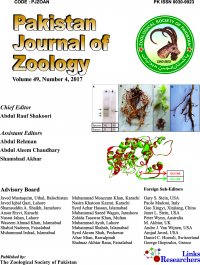In Silico Analysis of Genome Wide Non-Synonymous Single Nucleotide Polymorphisms in Indigenous Cattle Breeds of Pakistan
In Silico Analysis of Genome Wide Non-Synonymous Single Nucleotide Polymorphisms in Indigenous Cattle Breeds of Pakistan
Umer Farooq1,2, Nimra Murtaza2, Abubakar Siddique1, Bilal Saleem1, Obaid Ur Rehman1, Nageen Zahra1, Muhammad Uzair1, Muhammad Naeem Riaz1,3* and Muhammad Ramzan Khan1*
ABSTRACT
Genomic selection programs for yield enhancement and disease resistance have become a reality with the availability of highly detailed genomic information. This information is critical to highlight genetic polymorphisms related with economically important traits including milk and meat yield, development, and resistance against diseases. In this present study, our main objective was to identify the deleterious SNPs and their associated genes which possibly disrupt protein’s structure and function, as well as lead to genetic disease. We performed genome wide reference-based sequence alignment and functional annotation to identify deleterious non-synonymous SNPs (nsSNPs) in cattle breeds of Pakistan. For this purpose, genomic data of four different purpose cattle breeds including Bhagnari, Cholistani, Sahiwal and Red Sindhi was analyzed. Comparison with taurine reference genome ARS-UCD.1.2.99 discovered 29,032,662 genomic variations of which 25,469,157 were single nucleotide polymorphisms (SNPs) and 3,563,505 were Insertion/Deletions (InDels). Functional annotation identifies 122,943 missense SNPs that may possibly affect economically important traits. Using sequence and structure based computational tools SIFT, we identified 154 deleterious variants in 134 genes. Gene enrichment highlighted the presence of these genes in different biological processes including developmental, signaling, transport, metabolic and homeostasis. These findings are useful resource for further exploration into the molecular processes associated with these variances.
To share on other social networks, click on any share button. What are these?










